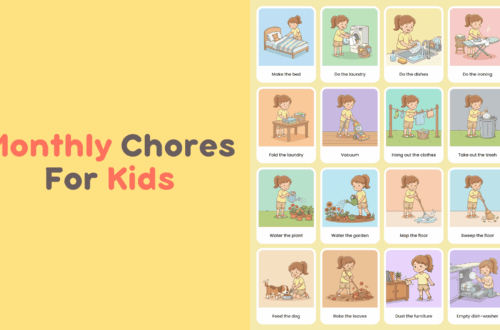By ages 9-12, kids are becoming more capable, independent, and eager to take on “grown-up” responsibilities. This stage is perfect for expanding their household chores and teaching them essential life skills. A well-structured system, paired with consistency, helps preteens stay motivated and feel proud of their contributions. Apps like Kikaroo can simplify this process by keeping tasks organized, fair, and even fun.
Why Chores Matter for Preteens
At this age, kids begin to understand the bigger picture of family life and teamwork. Assigning them more complex chores not only lightens the parents’ load but also prepares kids for real-world skills like time management, accountability, and problem-solving. Preteens thrive when they can see how their efforts impact the household.
The Ultimate Chore List for Ages 9-12
Here are some chores that are well-suited for this age group:
- Keeping their own room tidy and organized
- Preparing simple meals (sandwiches, scrambled eggs, or pasta)
- Washing dishes or loading/unloading the dishwasher
- Doing laundry from start to finish
- Taking out the trash and recycling
- Yardwork: mowing the lawn, raking leaves, or pulling weeds
- Walking dogs or independently caring for pets
- Helping younger siblings with basic tasks
- Vacuuming, dusting, and wiping down surfaces regularly
- Assisting with grocery shopping (making a list, carrying bags, unpacking items)
With digital chore chart app for kids, parents can assign these more advanced tasks in a clear, structured way while letting preteens track their own progress and earn rewards that keep them motivated.
How to Keep Preteens Engaged in Chores
- Give choices: Let them pick between two or three tasks.
- Rotate jobs: This prevents boredom and teaches different skills.
- Set clear expectations: Be specific about what “done” means.
- Connect rewards to effort: A points system – like Kikaroo offers-makes their hard work feel meaningful without constant reminders.
Tips for Parents
- Stay consistent – don’t back down when resistance arises.
- Praise effort, not perfection.
- Use chores as teaching moments rather than punishments.
- Encourage teamwork – working alongside parents or siblings builds stronger family connections.
Conclusion – Preparing for Teen Independence
Preteens are on the cusp of greater independence, and chores provide an excellent opportunity to prepare them for the responsibilities of teenage and adult life. By giving them a structured chore list and tools to track their progress – such as the Kikaroo app – parents can foster responsibility, confidence, and life skills that will last well beyond childhood.

 Home
Home Features
Features Testimonials
Testimonials Downloads
Downloads FAQ
FAQ Blog
Blog








